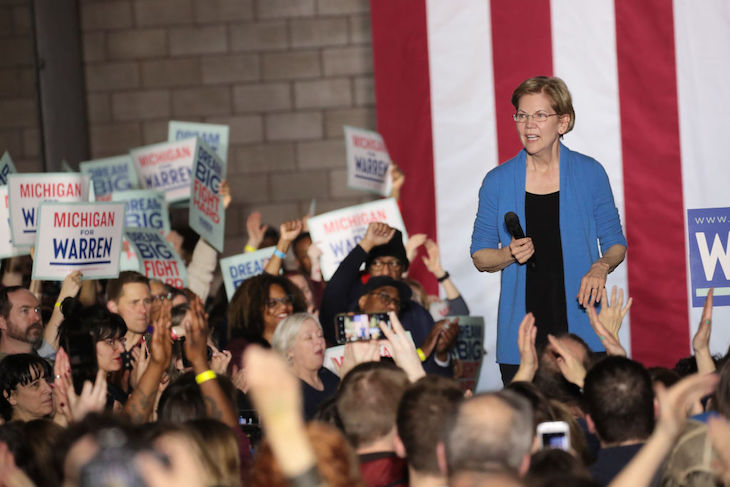It was a long and winding rollercoaster ride for Elizabeth Warren on the presidential campaign trail. And when that ride ended, everybody who planted their feet back on earth was a little nauseous.
Warren, the two-term senator from Massachusetts and anti-bank regulator with a work ethic and professor’s aura, reassessed the state of her campaign today and determined that it was time to get out of the race with dignity. Warren’s team expected to finish in second place in a number of states on ‘Super Tuesday’, which would have given her an excuse to stay in the race – as she increased her delegate count. Instead, she ended up in a terrible position; reaching 15 per cent in only five out of 14 contests, and finishing in third-place in her own state of Massachusetts. Even Warren’s own campaign manager, the chief spinmeister of her operation, admitted that Super Tuesday was a major disappointment for the campaign.
Warren began her campaign last year as the candidate who would not only represent the average American struggling to pay the electricity bill at the end of the month, but also the candidate who could use magical superpowers to strike down the hedge-funders, billionaires, and insurance executives of corporate America. As time wore on, Warren was by far the most substantive option in the field, offering up detailed policy proposals on every subject one could possibly think of. If the Democratic presidential nomination went to the man or woman with the most intellectual heft, Warren would have won the race by a landslide.
The bespectacled senator was actually riding high this fall, when Bernie Sanders looked wobbly after his heart attack and Joe Biden looked even wobblier on the debate stage. In early October, she topped the polls nationally, besting Biden and the other dozen or so candidates still in the race.
Unfortunately, Warren’s high didn’t last. The woman-with-a-plan was increasingly unable to explain how she would pay for the massive costs associated with her healthcare proposals. When moderators asked if her plan meant taxes would increase, Warren dodged and weaved like a typical politician, knowing full well that simply taxing the rich wouldn’t get the job done. In contrast, Bernie Sanders, her ideological compatriot and friend, was at least honest about the fact that taxes would rise for the middle-classes under his watch. As is always the case with frontrunners, Warren’s glide to the top of the pack increased her exposure to incoming fire from her competitors, particularly moderates like Pete Buttigieg and Amy Klobuchar, who depicted Warren’s stack of plans as a waste of paper that had no chance of becoming law in Washington, D.C.
And then there was Bernie. Warren’s relationship with the old revolutionary from Vermont has always been cordial (the two consider themselves friends and allies in the US Senate). Unfortunately, cordiality tends to take a backseat when the presidency is on the line. Warren and Sanders may be kindred spirits ideologically and politically, but their similarities complicated the path forward for Warren. Sanders has a support base as fervent and strong as Donald Trump’s is on the right. A loud, vocal, but powerful minority who would jump off a cliff if Bernie led the way. It’s a bloc Sanders built during his first run for the presidency in 2015-2016 and has cultivated in the four years since. Warren, as respected as she is in the Senate and among her fellow Democrats, doesn’t have the same bedrock constituency as Bernie Sanders. At the race wore on, she tried to portray herself as the unifier of the Democratic Party’s progressive and moderate camps. But this, too, was problematic and may very well have cost her support among progressives, who aren’t in the mood to compromise.
Elizabeth Warren will be fine, in the end. There are many failed presidential candidates that have gone on to have illustrious careers. Think of Ted Kennedy, whose 1980 insurgent campaign against President Jimmy Carter was subdued at the Democratic convention. Or Mitt Romney, who ran for president twice and is now carving out a name for himself in the Senate as an independent Republican. Warren will go back to the Senate and represent the Commonwealth of Massachusetts with dignity, as she always has. She may even be nominated for a cabinet position in the event of a Democratic victory in November.
With four candidates dropping out within a week of one another, the Democratic presidential primary is now a two-man race between Bernie Sanders and Joe Biden. Warren will now watch the rest of the election unfold like the rest of us.
Got something to add? Join the discussion and comment below.
Get 10 issues for just $10
Subscribe to The Spectator Australia today for the next 10 magazine issues, plus full online access, for just $10.




















Comments
Don't miss out
Join the conversation with other Spectator Australia readers. Subscribe to leave a comment.
SUBSCRIBEAlready a subscriber? Log in